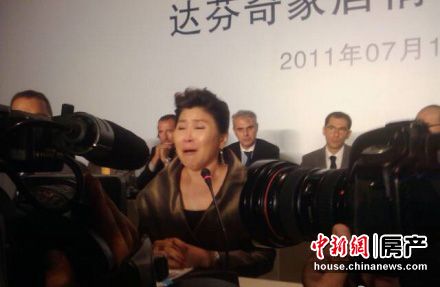A Shanghai-based furniture company has defended the authenticity of the origin of its high-end products, insisting that most of the items were purely Italian-made.
The statement followed an investigative report that challenged the company's claims and the shabby quality of its luxury products.
The Da Vinci Home Corporation manufactured furniture in Guangdong Province before shipping the items to Italy and then bringing them back to China, where they were labeled as imported foreign-branded goods and sold for ten times the price of domestic brands, a report based on insider accounts by China Central Television (CCTV) revealed Sunday.
The company denied the charge but conceded Wednesday at a press conference that its products were not 100 percent Italian-made. Rather, some were manufactured by domestic contractors and do not carry false or misleading labeling, it said.
Doris Phua, Da Vinci's founder and CEO, admitted that the company uses 30 Chinese furniture-producing contractors, including Dongguan Changfeng and Golden Phoenix Furniture (International) Group in Guangdong Province, and sells their products as domestic brands.
However, her remarks fell short of satisfying enraged customers, who paid prices for furniture carrying fake foreign brands that were more than ten times higher than the average market price for domestically-produced furniture.
Phua said that all Italian-branded furniture sold in Da Vinci outlets nationwide were indeed manufactured in Italy.
"But some US furniture brands in our stores, such as Hollywood Homes and Ralph Lauren, are made in countries including China, Vietnam, India, the Philippines and Indonesia," she said.
Founded in 2000, Da Vinci Home Corporation made its name by selling top international brands such as Versace and Armani and claiming that all its products were imported items.
The company's outlets in Beijing and Guangzhou have begun accepting refund applications, reports said Wednesday.
However, stores in Shanghai are still refusing to offer refunds.
One order returned to the Guangzhou outlet was worth over two million yuan ($309,234), one of the biggest returns so far.
Sales staff revealed that most of the refund requests come from customers who have not yet received their furniture because most orders take at least four months to be delivered.
A couple from Shanghai who declined to reveal their names told the Global Times at the press conference Wednesday that they bought five pieces of Cappelletti brand furniture at the Da Vinci outlet for more than 1 million yuan in late 2009 in Shanghai.
"After hearing about this news conference, we thought it was an opportunity to ask Da Vinci's management about refunds and compensation. It's a fraud," said the man, who was unsatisfied by the company's explanation.
False claims as to the furniture's origins were not the only accusations contained in the CCTV report.
Consumers also complained about pungent smells coming from the furniture and poor quality.
The furniture featured by CCTV failed to meet national standards after it was tested by the National Center for Quality Supervision and Inspection of Furniture and Indoor Environment.
The General Administration of Quality Supervision, Inspection and Quarantine has asked its Shanghai branches to launch an investigation into Da Vinci's import and export records, according to the Beijing Times.
The administration was not available for comment Wednesday.
The Da Vinci scandal is the latest in a series of cases that have seen domestically-produced goods masquerading as high-end overseas brands.
Scient Baby formula, which was revealed to have added excessive quantities of melamine into milk power in 2009, claimed it was a US company. But no details of its registration have ever been found in the US.
Order, a flooring brand that claimed to be German, was exposed in a CCTV report as a domestic brand.
China has over 200 million luxury consumers and more than 60 percent of them purchase luxury goods at least once a year, according to statistics from the World Luxury Association (WLA).
Counterfeit items are appearing more frequently as demand for luxury goods soars, Ouyang Kun, chief representative of the WLA's China office, told the Global Times.
More government restrictions and inspections are urgently needed to regulate the market, he added.
Qiu Baochang, president of the legal panel at the China Consumers' Association, told the Global Times that the law allows consumers to ask for a full refund and additional compensation equal to the goods'retail price.
"Some homemade products become more expensive and are better received in the domestic market under the guise of fake foreign brands," Qiu said, adding that the public should show a rational attitude toward luxury goods and not blindly worship foreign brands.
He said that the authorities should intensify supervision and market-entry management.


















